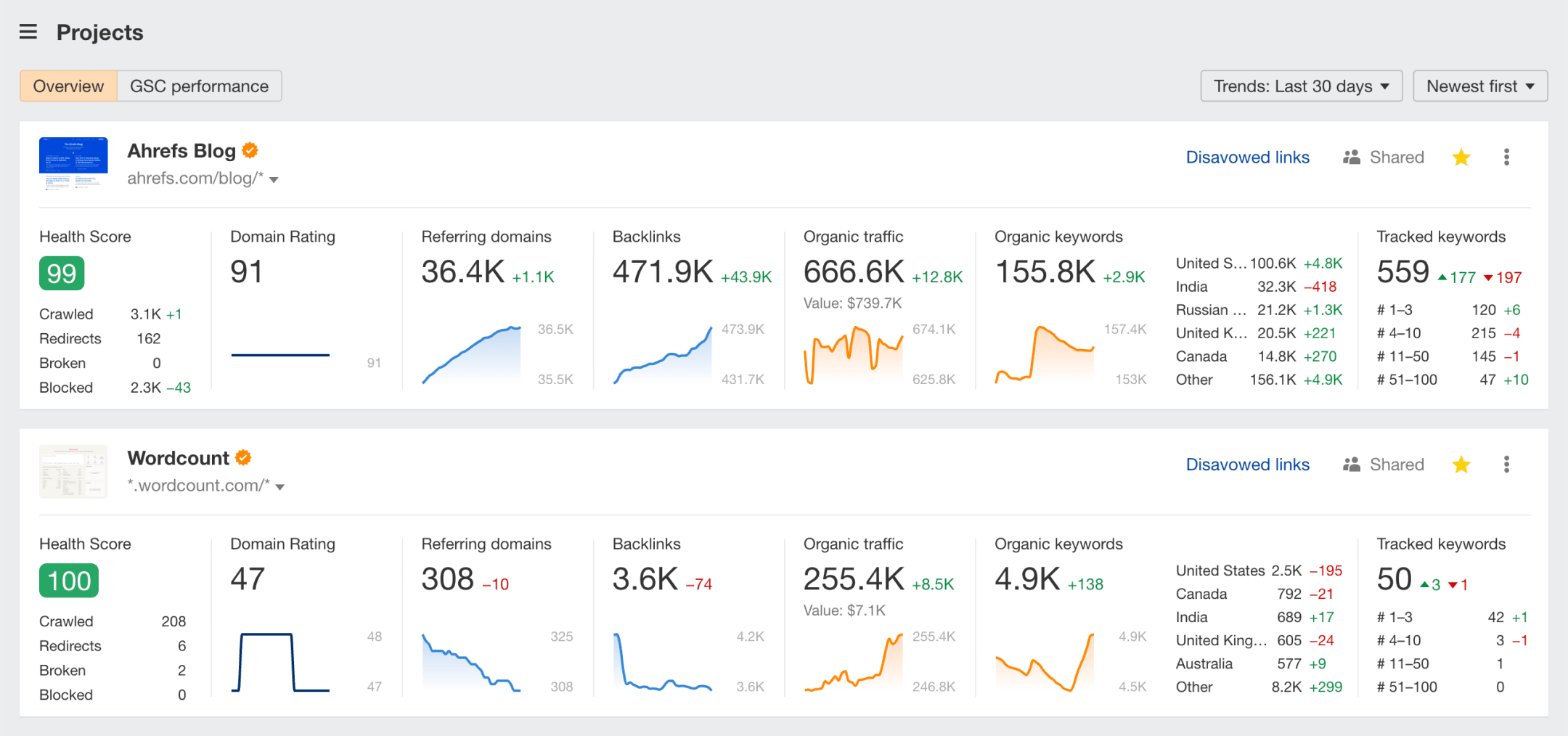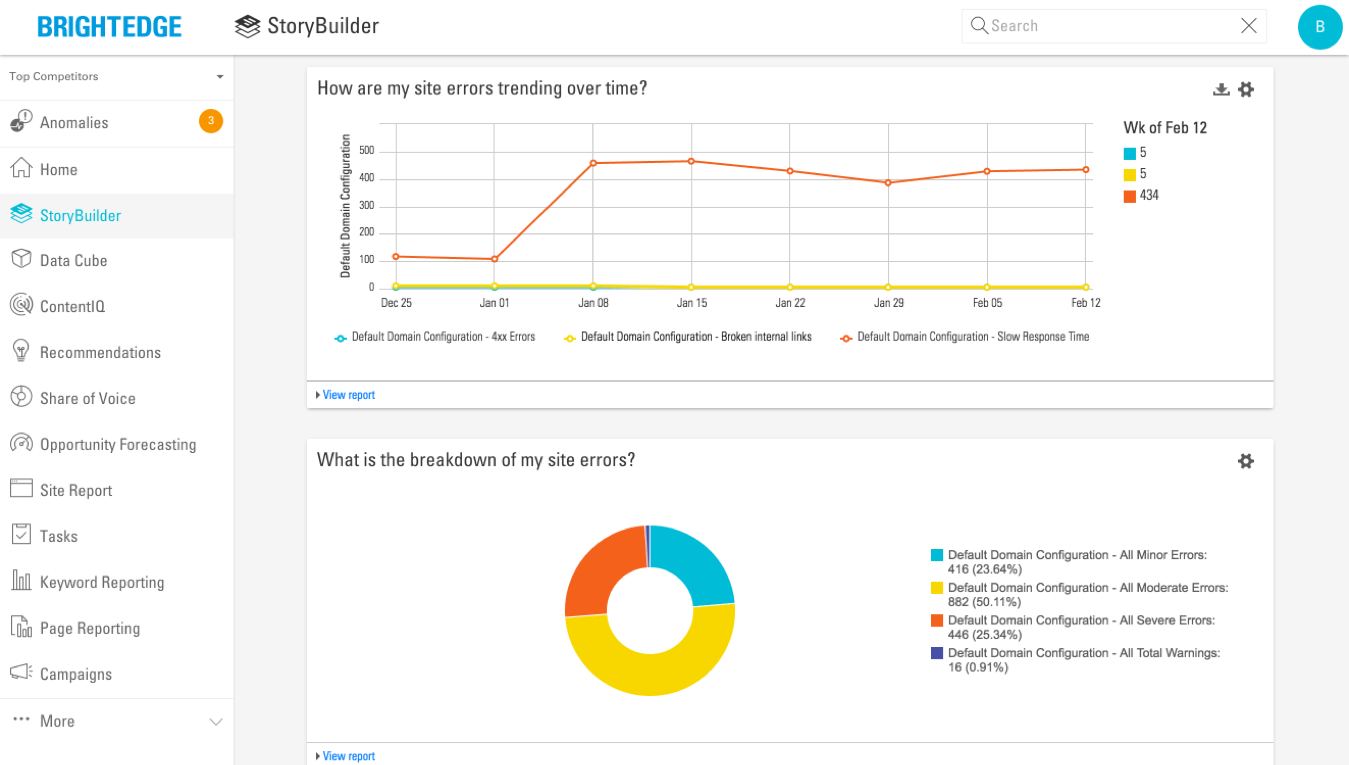Alternatives to Adobe Sensei for Commerce
1. Ahrefs
+Pros
- Exceptional backlink analysis depth and data accuracy .
- Comprehensive keyword research capabilities .
- AI-enhanced features provide practical ecommerce applications .
-Cons
- Credit-based usage model creates workflow disruptions .
- Significant learning curve .
- Integration limitations requiring API integrations for deep ecommerce platform connectivity .
- Pricing structure challenges for smaller organizations .
- Real-time monitoring capabilities lag behind specialized solutions.
One highlighted feature and why it's amazing
Grades existing content against top competitors using natural language processing, providing optimization recommendations .

Another highlighted feature of why it’s amazing
Addresses technical SEO challenges at scale, generating meta tags for multiple product pages simultaneously through the Site Audit feature .
2. BrightEdge Data Cube
+Pros
- Enterprise-Scale Technical Capabilities
- Proven Revenue Impact
- Comprehensive ROI Attribution
- Specialized Enterprise Focus
-Cons
- Implementation Complexity
- Platform Reliability Concerns
- Resource Intensity Requirements
- Limited Market Accessibility
One highlighted feature and why it's amazing
Performs comprehensive large-scale technical audits, automatically identifying crawlability issues and optimization opportunities across extensive product catalogs .

Another highlighted feature of why it’s amazing
Processes billions of data points to identify content gaps and competitive opportunities in adjacent markets .
3. MarketMuse Research & Competitor
+Pros
- Patented topic modeling technology provides deeper semantic analysis compared to correlation-based alternatives
- Content cluster optimization capabilities unavailable in competitors like Frase or Clearscope
- Personalized difficulty scoring based on site-specific authority rather than generic metrics
- Proven content scaling results with customers achieving tripled blog cadence and 70% reduction in content planning time
- SERP X-Ray and Heatmap visualization for sophisticated competitor gap analysis
-Cons
- Editorial oversight dependency - success requires human optimization of AI-generated content briefs
- Data dependency - sparse content inventories undermine gap analysis effectiveness
- Technical SEO limitations - Surfer SEO outperforms in SERP analysis metrics
- Specialized focus limits utility for comprehensive SEO management needs
- Quality control requirements - algorithmic rigidity may ignore brand voice without human editing
One highlighted feature and why it's amazing
Provide comprehensive research automation with competitor gap analysis, enabling 70% reduction in content planning time.

Another highlighted feature of why it’s amazing
Delivers sophisticated competitor content gap analysis, enabling strategic identification of content opportunities unavailable through traditional keyword research.
Other Alternatives
NeuronWriter
Outranking
Semrush Copilot
Surfer SEO Content Editor
seoClarity
How We Researched This Guide
About This Guide: This comprehensive analysis is based on extensive competitive intelligence and real-world implementation data from leading AI vendors. StayModern updates this guide quarterly to reflect market developments and vendor performance changes.
202+ verified sources per analysis including official documentation, customer reviews, analyst reports, and industry publications.
- • Vendor documentation & whitepapers
- • Customer testimonials & case studies
- • Third-party analyst assessments
- • Industry benchmarking reports
Standardized assessment framework across 8 key dimensions for objective comparison.
- • Technology capabilities & architecture
- • Market position & customer evidence
- • Implementation experience & support
- • Pricing value & competitive position
Research is refreshed every 90 days to capture market changes and new vendor capabilities.
- • New product releases & features
- • Market positioning changes
- • Customer feedback integration
- • Competitive landscape shifts
Every claim is source-linked with direct citations to original materials for verification.
- • Clickable citation links
- • Original source attribution
- • Date stamps for currency
- • Quality score validation
Analysis follows systematic research protocols with consistent evaluation frameworks.
- • Standardized assessment criteria
- • Multi-source verification process
- • Consistent evaluation methodology
- • Quality assurance protocols
Buyer-focused analysis with transparent methodology and factual accuracy commitment.
- • Objective comparative analysis
- • Transparent research methodology
- • Factual accuracy commitment
- • Continuous quality improvement
Quality Commitment: If you find any inaccuracies in our analysis on this page, please contact us at research@staymodern.ai. We're committed to maintaining the highest standards of research integrity and will investigate and correct any issues promptly.